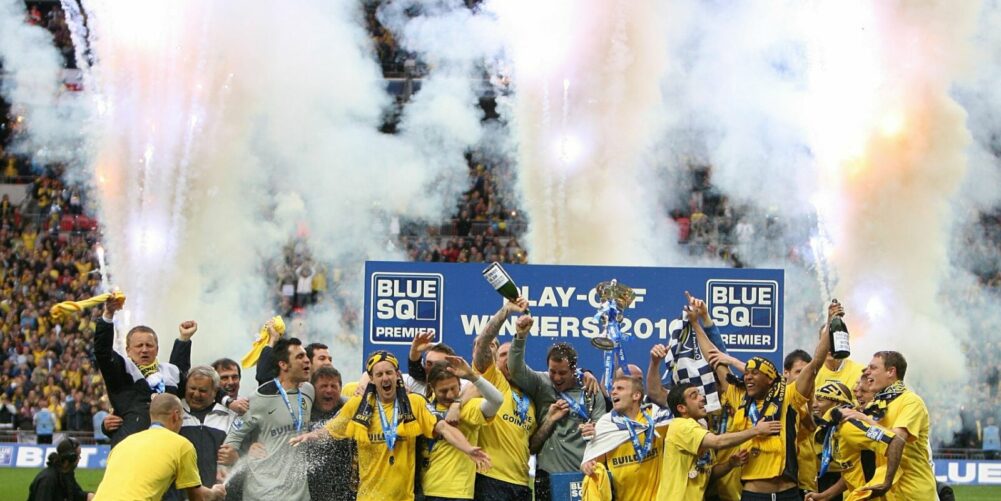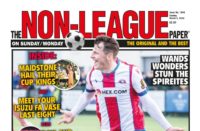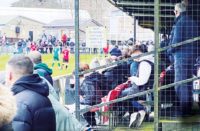By Chris Dunlavy
By the time Mark Creighton joined Oxford United in the summer of 2009, he knew exactly why United had spent three years marooned in Non-League.
“You look at these big clubs who get stuck in the National League and it's always the same story,” says the 38-year-old,who arrived from rivals Kidderminster Harriers.
“They're used to playing at nice grounds every week. Not so much rough and tumble. Then suddenly you're away at Barrow on a Tuesday night. You're not only getting battered by horrible burly blokes. You're getting battered by wind, hail, sleet. It's minging.
“If you can't adapt to that very quickly, you will fail. And that's why Oxford did fail. It's not that they didn't take the league seriously. They just didn't fully understand it.
“They thought they could rely on having a big fanbase. On paying a bit more money for good players. And in that league, those things can count for very little. What really matters is having good experienced pros who know the level.”
Enter Chris Wilder, the architect of a transformation that would ultimately end in a glorious return to the Football League. Today, the 52-year-old is regarded as one of the finest managerial talents in England, the figurehead of an innovative and attacking Sheffield United side on the cusp of European qualification.
Back then, he was merely a young coach dealt an ugly hand. Laid off when Halifax folded in 2008, Wilder had been working as assistant to Alan Knill at Bury when the U's came calling. It was a glorious opportunity, but one fraught with peril; after all, the side bequeathed by Darren Patterson in December 2008 was a mess.
Soft centred. Shot shy. Abysmal on the road. Burdened by the club's status and bullied by bruisers like Creighton,too many of their players had crumbled amid the perennial expectation of promotion. Wilder, though, was not intimidated. And just as he would at Bramall Lane seven years later, the Yorkshireman cleaned house. Out went the egos, the ‘names' and the EFL dropouts. In came grizzled veterans of the division.
Creighton, who'd earned his spurs at Redditch, Halesowen and Paget Rangers before captaining Kiddy, was followed through the door by Matt Green, Damian Batt and Simon Clist. All three were promotion winners in seasons past, whilst midfielder Dannie Bulman – signed from Crawley – was renowned as one of the most metronomic performers in the Conference.
“You'd be in that dressing room, or lining up in the tunnel, looking around at who's got a yellow shirt on,” recalls Creighton. “Then you'd look at the opposition and think ‘You ain't beating us today kids. There's no way that we are losing'.
“Because I'm looking round at my boys and I'm going ‘Well you ain't getting the better of him, you ain't getting the better of him, you certainly ain't getting the better of me and, by the way, James Constable is probably going to score twice'.
“Mentally, I'd already won the game in the tunnel – and that comes down to what you build in the dressing room. That is still Chris Wilder's great strength for me. He's brilliant at spotting a player who'll fit his ethos, do a day's graft and give him that little bit more.”
For a while, at least, Oxford did indeed seem invincible. Wilder's men won all but six of their first 23 matches and spent 147 straight days at the Conference summit. Highlights included 4-0 hidings of Eastbourne and Chester, a 5-0 victory over Grays Athletic and a 2-1 win against rivals Stevenage.
“I've never experienced that feeling, either before or since,” recalls Constable, now 35 and a free agent after leaving Hungerford Town in December. “The team spirit. The togetherness. Coming into games with total confidence, knowing that no matter who was on the other side, we would get a result.
“Chris Wilder was a big part of that. He was very open, very honest. If you didn't work hard, you didn't get in the team. But we were very well-drilled too. The level of detail Chris and his staff went into was meticulous.
“Every opponent we faced, we knew about their players, how their manager liked to play, their formation and set pieces. We almost went out there with a blueprint and it made our game supremely easy.”
If Creighton was Oxford's doughty anchor and Bulman the engine room, Constable was Wilder's deadly bludgeon. Elbows, cunning, dirty tricks; like a lower-league Alan Shearer, the striker didn't so much score goals as hustle them.
Prolific for Kidderminster, Constable had joined Shrewsbury Town of League Two in January 2008, only to be sidelinedwhen a new manager arrived. Loaned to Oxford for the 2008-09 campaign, he played like a man with a point to prove, netting 26 times to convincethe newly installed Wilder that a permanent deal was essential. It would prove a wise investment as Constable, aided by Green, replicated the previous season's tally.
“James was a proper No.9,” says Creighton. “We were at Kiddy together and I still remember the first time I saw himon the training ground. I was like ‘Jesus, this guy is top class'. He was ruthless. He was brave. He'd bully centre-halves. He'd put his head in where it would get hurt. He didn'tcare. He just wanted to score, and he very rarely passed in front of goal.
“But he would also do the horrible side of football. He wasn't one of these forwards who would swing their arms aroundand moan when the ball was given away. He'd be there, arms pumping, sprinting back to snap someone in half trying to get it back.
“That's why fans loved James. He was similar to me in that I was never incredibly gifted. But I played like a fan.I would do anything it took to win football matches and I fought for the shirt. People respected me not because of what I did but because of how I did it, and it was the same with James.”
If the Conference could provide little to halt Oxford's charge, mother nature would prove a more challenging opponent. The winter of 2009-10 brought almost 20 days of continuous snowfall and freezing temperatures. Grit ran out. Motorways closed. Football was decimated. Between December 5 and January 16, the U's played just one game, allowing a rampant Stevenage to seize top spot. Bythe time they returned, all momentum had evaporated.
“We'd lost that little bit of fluidity,” explains Creighton. “When you're winning, it's easy. But the minute you breakthat Saturday-Tuesday cycle, it gets a lot harder.“Liverpool are a prime example. For six months, they didn't look like losing. Then they went on a winter break andall that cohesion vanished. It's exactly what happened with us.”
Beaten 1-0 at Kassam by lowly Tamworth in their first game back, Oxford would win just five of their next 15 matches.That run included a 1-0 reverse at Broadhall Way which effectively left Stevenage home and hosed. Wilder's men eventually rallied to finish third behind Luton. “Once the title was gone it was almost like ‘Right, let's get focussed for the play-offs,” recalls Constable.
Back in the groove after four wins from their final six games, the U's made short work of Rushden & Diamonds in their two-legged semi-final. To widespread surprise, their opponents in the final were York City, who'd knocked out a Luton side previously unbeaten in 14 games.
“We'd played York on the first day of the season and they battered us,” says Creighton. “We scored two goals in the last three minutes and beat them 2-1, but we were god awful. So they went into the final all cock-a-hoop. Their manager, Martin Foyle, was coming out and saying ‘Oh, they haven't got enough to cope with us, this, that and the other. But Chris said to us ‘Let them do the talking. I'll do the press. If anyone asks you, just say you're looking forward to it'.”
Creighton recalls feeling supremely confident on the day. “I played for Kiddy in the first ever final at the new Wembley and I don't mind saying my a*** fell out.,” he says. “I'd gone from playing for Redditch United to in front of a few hundred people to 57,000 people. But when I went back with Oxford, I knew what was coming – and so did most of the other lads in that team as well.”
Oxford went off like a train, a volley from Green and Constable's classy drive ensuring a 2-0 lead inside 20 minutes. Then, on the stroke of half-time, disaster struck. Keeper Ryan Clarke, a towering figure over the course of the season, fumbled a hopeful Ben Purkiss cross over his own line. Up in the stands, 33,000 U's fans lapsed into shocked silence.
“It's possibly the worst mistake I've ever made, and on the biggest occasion,” says Clarke, now at Bath City. “It changed the mood, the atmosphere – everything. At the time, you want the ground to swallow you up. Had it been a different game, I think the gaffer might have let loose on me. But he just left me to it. He understood the magnitude of the situation and let the boys pick me up. I actually went back out in a pretty good frame of mind.”
Constable adds: “Clarkey had an unbelievable season. He'd been the best keeper, not just in our league but probably a couple above as well. He'd kept us in so many games and we felt as a team that we almost had to go out there second half and do it for him.”
And they did. York, overwhelmed and overawed, never threatened and were finally put out of their misery in the 90th minute when Alfie Potter calmly capped a searing counter attack. Wilder, famously, celebrated with a knee slide across the rain-lashed turf. Over the following weeks there would be bus parades, civic dinners and all manner of celebrations to mark the U's return to the Football League.
And for Constable – who recently met up with Wilder and several former team-mates for a ten-year-reunion – the summer would bring a bizarre postscript. “I went away to Ibiza with Matt Green and a few of his mates,” he laughs. “We were walking down the strip in San Antonio,all merry and having a good time.
“Then we look over at this table and there's a load of the York lads sitting at a table. We didn't know whether to just keep our heads down and walk past, but we ended up saying hello and we actually had a great bit of banter. It was a great time and something we all look back now as a defining moment in our careers. It was the best team I ever played in, that's for sure.”




















